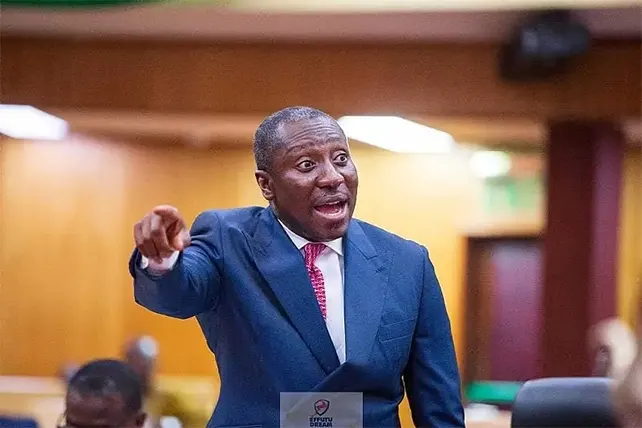Minority Leader Alexander Afenyo-Markin has launched a scathing attack on the Mahama-led administration, accusing it of pervasive corruption and deceptive practices, epitomized by what he terms the “60:40 regime.” This label, according to Afenyo-Markin, reflects the government’s alleged modus operandi of demanding a 60% cut for themselves while leaving only 40% for legitimate purposes. He argues this system of kickbacks and self-enrichment has become deeply entrenched, permeating every level of governance and contributing to the nation’s economic woes. Speaking during the debate on the 2025 Mid-Year Budget Review, Afenyo-Markin characterized the NDC government as a cabal driven by greed and institutionalized corruption, claiming this “60:40” system is now common knowledge on the streets of Accra. He contends that the government’s actions, particularly in the economic sphere, are a testament to this alleged corruption.
Central to Afenyo-Markin’s accusations is the Attorney General’s decision to discontinue the prosecution of former Finance Minister Kwabena Duffuor and seven others, a case stemming from the 2018 financial sector cleanup. He alleges this decision, based on a newly introduced “60% recovery benchmark” for dropping charges, signifies a blatant disregard for justice and opens the door to political manipulation of the legal system. This benchmark, according to Afenyo-Markin, allows individuals implicated in financial malfeasance to negotiate their way out of prosecution by returning a portion of the allegedly misappropriated funds, effectively institutionalizing corruption and undermining the rule of law. He argues that this practice is not merely incompetence but a calculated strategy of rent-seeking, where corruption is woven into the fabric of conducting business within the country.
Afenyo-Markin further broadened his critique to encompass the Ghana Gold Board, accusing the institution of facilitating illegal mining activities under the guise of gold purchasing. He contends that the Gold Board, instead of regulating the mining sector and curbing illegal operations, has become complicit in the environmental destruction caused by galamsey, profiting from this illicit trade. This, he argues, demonstrates the government’s hypocrisy in claiming to combat illegal mining while simultaneously enabling and benefiting from it. He paints a picture of a government driven by self-interest, prioritizing short-term gains over the long-term well-being of the environment and the communities affected by these destructive practices.
The Minority Leader’s assault on the government extended to its economic policies, accusing the Finance Minister of presenting a misleading picture of the nation’s economic health. He argued that the purported improvements in debt-to-GDP ratio are merely the result of statistical manipulation and debt restructuring initiated by the previous NPP administration, not actual debt reduction. Afenyo-Markin further criticized the government’s allocation of GH¢0.5 billion for job creation as woefully inadequate to address the widespread unemployment crisis, linking the lack of opportunities for young people to the rise in insecurity and the proliferation of illegal mining activities. He asserts that the government’s economic mismanagement is directly contributing to social instability, as desperate youth turn to illegal means of survival.
Afenyo-Markin also condemned the government for abandoning legacy programs like Agenda 111 and Planting for Food and Jobs, initiatives started by the previous administration. He argued that the neglect of these programs has left communities vulnerable, impacting access to healthcare and food security. Furthermore, he attributed the alarming number of road accident deaths to the government’s failure to maintain the road network, blaming their inability to pay contractors for the deteriorating conditions and characterizing every pothole as a “death trap.” He directly linked these failures to the government’s alleged mismanagement and misplaced priorities.
In his concluding remarks, Afenyo-Markin accused the Mahama administration of hypocrisy, claiming they are now reaping the benefits of the difficult reforms implemented by the NPP while simultaneously criticizing the previous government for the necessary spending during the pandemic. He labelled the NDC as the “true apostles of hypocrisy” and declared that the “60:40” label would be their legacy. He pledged that the Minority would continue to expose what he termed a “grand economic heist disguised as governance,” vowing to hold the government accountable for its actions and advocate for transparency, justice, and genuine development. He framed the current situation as a betrayal of the public trust and a subversion of the democratic process, emphasizing the need for continued scrutiny and opposition to the government’s policies.














